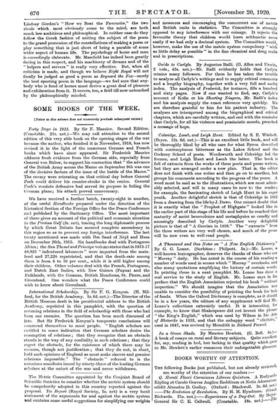A Thousand and One Notes on "A New English Dictionary."
By G. G. Louse. (Surbiton : Philpott. 5s.)—Mr. Loser, a well-known lexicographer, deserves the thanks of those who use " Murray " daily. He has noted in the comae of his reading s number of words used in senses which " Murray " overlooks, and also many quotations amplifying the history of certain words. In printing these in a neat pamphlet Mr. Loane has done a real service to the study of English. Mr. Loans says in ki3 preface that the English Association rejected his book "without inspection." We should imagine that the Association W33 unable to consider the possibility of printing the book for lack of funds. When the Oxford Dictionary is complete, as it should be in a few years, the editors of any supplement will find Mr. Loane's collections extreinel3r useful. It is interesting, for example, to know that Shakespeare did not invent the phrase "the King's English," which was used by Wilson in his Ade of Maori& in 1553, and that the unhappy word "
used in 1647, was revived by Meredith in Richard Feverel.


































 Previous page
Previous page